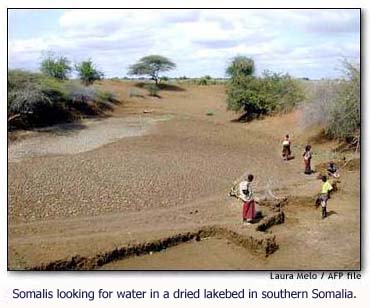
Somali
WATER Issues
Water, a basic
human necessity, a pressure resource in jeopardy, is a vital most essential
natural resource for all aspects of human existence, environmental survival,
economic development and good quality of life. As water is one of the Earth's
most precious, indispensable & threatened resources, it was dentified
lack of freshwater as being one of the five major problems facing humanity,
as it ranked fresh water second after population. It was also reported water
shortage as one of the two most worrying problems for the new millenium.
Despite of declaring by the UN the decade of '1981-1991' as the International
Decade for Water Supply and Sanitation, a total of 1.2 billion people still
do not have access to safe drinking water and another 1.7 billion do not
have proper sanitary means of disposing of human waste. As population grows,
economies develop and megacities expand, greater demand will be placed on
freshwater supplies. The whole issue of global food security is closely
linked to water availability. This valuable life and economic supporting
resource is globally being wasted and abused, and widespread water pollution
makes available water unusableUnlike a resource such as oil, for which coal,
wind, hydroelectric or nuclear power can be an alternative, water has no
substitute and like religion and ideology it has the power to move millions
of people because of its scarcity or abundance. Lack of funds and investments
for water development is one major reason and threat for a looming global
water crisis. Other obstacles are political, social and environmental. Water
issues have been internationalized during 1990s for number of reasons including
scarcity, droughts, floods, pollution, sharing, conflicts.
Suffering from all types of water scarcities, Somalia, being a water scarce war-ravaged country, is by no means different from the above situation. In one hand, Somalia is located in an extreme water scarce area, where most of the available water resources exist in rivers shared with neighbouring countries and demand for water is increasing due to the population and urban growth. Further increase in water demand is expected when the current civil unrest is ended. On the other hand, Somalia is lacking, not only easily available water resources, both also the human and financial resources to set up institutions and water infrastructures that are desperately needed. Moreover, facilities that have previously been set up for water supply and irrigation were totally destroyed during the civil war. Scarce water resources in the country has negatively impacted on socio-economic activities in the country, contributed to increased poverty as well as social instability and political conflict.
Papers on Somali Water:
Managing
& Developing Water for Peace and Prosperity in New Somalia: Constraints
and Opportunities (Click
here)
Need for Managing & Developing Water for Peace and Prosperity
in Somalia (Click
here)
Vattenbrist Bakom Konflikterna (Article
'Water scarcity behind the Conflict' in Swedish published in one of Sweden's
largest Newspapers)
WATER: As a Cultural Issue & a Source of Conflict A Case of Somalia
(Click
here)
Need for Transboundary River Cooperation:
The Juba & Shabelle River Basins in the Horn of Africa (Click
here)
Somalias
Miljö och vattenproblem (click)
Kheyraadka
Biyaha Soomaaliya Warbixin (Click
here)
KHILAAFKA BIYAHA ADDUUNKA:
Xalka Soomaaliya Wuxuu Noqdo Karaa Xal Biyo (Click
here)
MAALINTA BIYAHA ADDUUNKA -
Warbixin Dhibaatooyinka Biyaha (Click
here)
Cooperation and Joint Development in International Water Resources: The
Case of the Limpopo and Orange River Basins in Southern Africa (Click
here)

